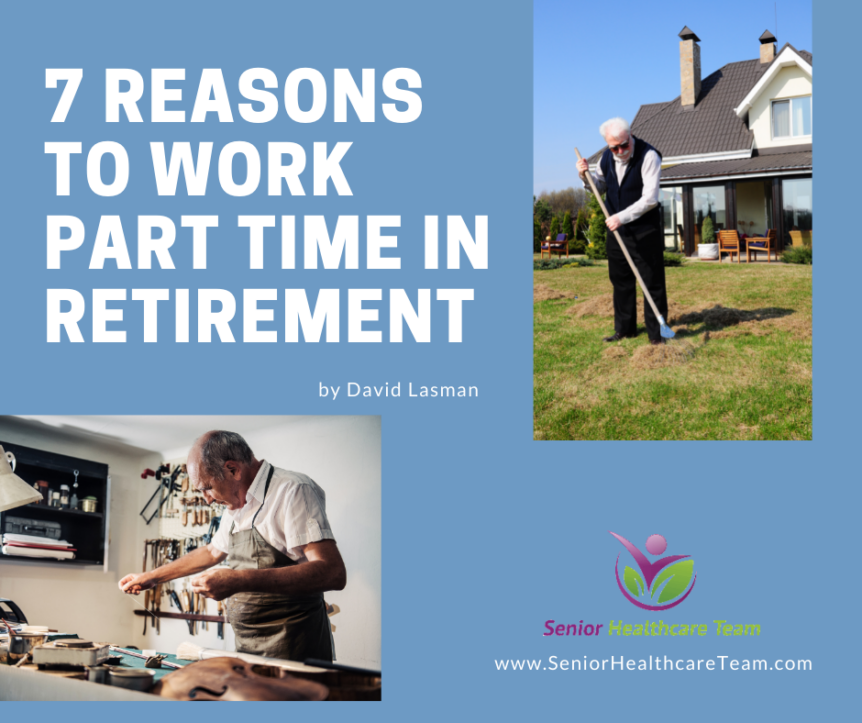A relaxed schedule allows you to earn money and increase your leisure time.
The financial benefits of a part-time job in retirement are obvious. You bring in some extra income, which gives your savings more time to grow. But many retirees also continue to work for the mental stimulation and social perks. Here’s a look at some of the benefits of getting a part-time job in retirement:
Social opportunities. If you do most of your socializing with colleagues at work, you might find retirement to be isolating. Retirees seldom get invited out to lunch to chat about the latest project or to company gatherings. A part-time job will give you new co-workers, customers or clients to chat with. You might decide to go out for drinks after work or get an invitation to the holiday party. “Some of the hazards of retirement, such as a lack of socialization, are really mitigated if you continue to work,” says Dr. Michael Roizen, the Cleveland Clinic’s chief wellness officer and co-author of “Ageproof: Living Longer Without Running Out of Money or Breaking a Hip.” “The people who don’t retire or who come back to work part-time live longer and live healthier with less disability.”
New challenges. After the initial thrill of sleeping in and relaxing wears off, you might want to try something new in retirement. A job can provide mental challenges that keep your mind active and your brain working properly. Writing a report, making a sale or learning how to use a new technology all take mental effort and provide stimulating new challenges for your retirement years. “Try to think of the things that you feel good about or passionate about or have an interest in,” says Sally Balch Hurme, author of “Get the Most Out of Retirement.” “Leaving your regular job allows you to explore something new.”

Physical activity. Without a job to go to, you might find yourself watching increasing amounts of TV. At a minimum, most jobs require you to get dressed and drive to your workplace. Some jobs require standing, lifting and other forms of physical activity. “The people who work are more physically active,” Roizen says. “They are less likely to develop chronic diseases if they are still physically active in retirement.”
An identity. The first thing you are asked when you meet someone new is often, “What do you do?” Most people answer this question with their job title. Retirees often lack a simple answer. Your job typically says something about the role you play in your community. A part-time job can give you a sense of purpose and an opportunity to feel useful to someone else. “You can build on your past experiences, your past skills and your past colleagues to look for that part-time job, or you can create your own new part-time job based on your interests,” Hurme says. “Your enthusiasm for the topic or the area will put you ahead in becoming a successful employee.”
Extra income. Some people need to work in retirement to pay for basic necessities, while others earn a paycheck in order to improve their retirement lifestyle. A retirement job might make it possible to eat at nicer restaurants, take on more ambitious travel plans or spoil your grandchildren. A paycheck allows you to withdraw less from your savings every month, which gives your nest egg more time to grow and can help your savings last longer. “People don’t realize how much they can affect their prospects by retiring later,” says Steven Sass, a research economist for the Center for Retirement Research at Boston College. “You need less money and you have more in your 401(k) and from Social Security.”
Health insurance. Some part-time jobs come with health insurance, which can be particularly important for people who retire before age 65 and are too young to qualify for Medicare. If you can find a part-time job that provides health coverage, you might be able to retire at a younger age than you otherwise would. Just make sure you take care to enroll in Medicare when you turn 65 or leave the job providing the health benefits.
Set your own schedule. Working 40 or more hours per week with a limited amount of vacation time makes it difficult to fit in all the other things you want to do. A part-time job boosts your leisure time, but also maintains your connection to the workplace. You might be able to work half days, a few days per week or for only part of the year. The rest of the time you are free to pursue hobbies, relaxation or travel. Work is less stressful when you aren’t required to be there quite so much.
By David Lasman – “Ask Medicare Dave” | President – Senior Healthcare Team
wwww.SeniorHealthcareTeam.com | 866-333-7340
Selecting the right healthcare plan through Medicare can be overwhelming and downright stressful. Senior Healthcare Team is a nationwide resource that provides guidance and support about Medicare to seniors at no cost to them and helps them to choose the most suitable insurance plan tailored to their specific needs and budget. Our goal is to educate and empower our clients to make the best decisions regarding their healthcare and clear up the confusion of Medicare. At Senior Healthcare Team, we aren’t partial to any one insurance company. Our loyalty is to our clients and our mission is to provide them with the best healthcare options at the very lowest cost.

